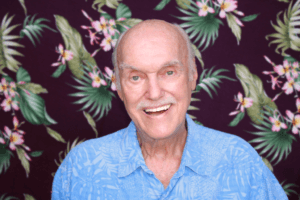Ram Dass is a clinical psychologist, researcher, and spiritual teacher known for his personal and professional relationship with Timothy Leary at Harvard University. He was born Richard Alpert in Newton, Massachusetts in 1931. He earned a Bachelor of Arts from Tufts University and his master’s from Wesleyan University. He received his doctorate in psychology from Stanford University. Alpert’s doctoral thesis examined Anxiety in Academic Achievement Situations.1
Alpert Meets Timothy Leary at Harvard
In 1958, Alpert accepted a position as a clinical psychology professor at Harvard. He specialized in personality development and human motivation. He worked in several departments at the university including social relations, psychology, and the Graduate School of Education. He was also a therapist in the Health Services department. Alpert met Timothy Leary while working at Harvard’s Center for Research in Personality and the two began doing research together. Also during this time, Alpert published his first book, Identification and Child Rearing.
Alpert and Leary conducted extensive research on the potential therapeutic effects of psychedelic substances like psilocybin and LSD. In 1960, they formed the Harvard Psilocybin Project. The goal of the organization was investigating the effects of psilocybin on volunteers and documenting their experiences. The project only lasted about two years and was shut down in March 1962. Other professors at the university voiced their concerns about how safe the experiments were (psilocybin and LSD were legal at the time) and whether the studies were robust enough to be taken seriously in the scientific community.2 There were reports that Alpert and Leary pressured their graduate students to take part in the study and that psychedelics were given to undergraduate students. Adding additional concern were reports that Alpert and Leary took psychedelics along with the students during some experiments. Alpert and Leary were fired from Harvard in 1963; Alpert for giving drugs to undergraduate students and Leary for not living up to his teaching duties.
The Good Friday Experiment
A well-known study that emerged from the Harvard Psilocybin Project was the first-of-its-kind Good Friday Experiment in 1962, also known as the Marsh Chapel Experiment. In this work. Alpert and Leary worked with Walter Pahnke of Harvard Divinity School to study whether psilocybin would produce spiritual experiences in religious people. The results showed 80% of the participants in the double-blind study who received psilocybin had profound religious experiences. In 2002 (published in 2006), Dr. Roland Griffiths of Johns Hopkins University reproduced the Marsh Chapel study under more rigorous conditions and got similar results.3
His Tranformation into Ram Dass
After leaving Harvard in 1963, Alpert and Leary headed to Mexico where they experimented on themselves with hallucinogenic mushrooms. In time, they became cultural icons. The mind expansion Alpert experienced led him to travel to India in 1967. There he met the Hindu guru and mystic Neem Karoli Baba who gave him the name Ram Dass meaning “servant of God.”
In 1971, Ram Dass wrote the landmark book Be Here Now. It details his academic and spiritual journeys and presents his recommendations for spiritual techniques, meditation, and yoga. The book served as one of the first guides for non-Hindus on becoming a yogi. It has also been called the “counterculture bible” of the hippie movement.
Ram Dass along with Steve Jobs and other contributors founded the Seva Foundation in Berkeley, California in 1978. The foundation brings together health care workers to treat blind people in developing countries like Nepal, Tibet, Cambodia, and Bangladesh. They also work on healthcare projects with Native American communities in the US.
More information on Ram Dass and his work can be found on his website and the Here and Now with Ram Dass podcasts.

